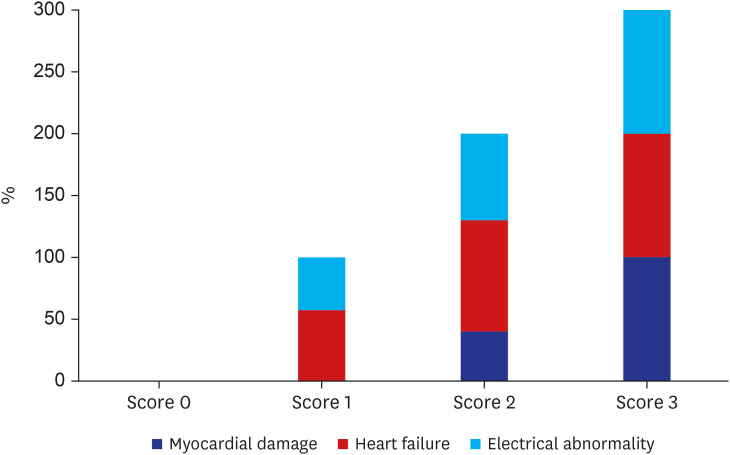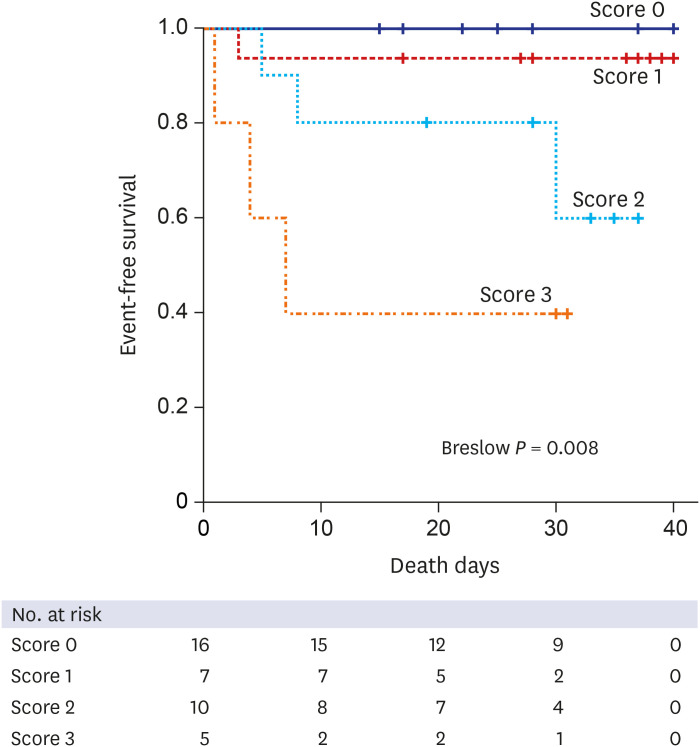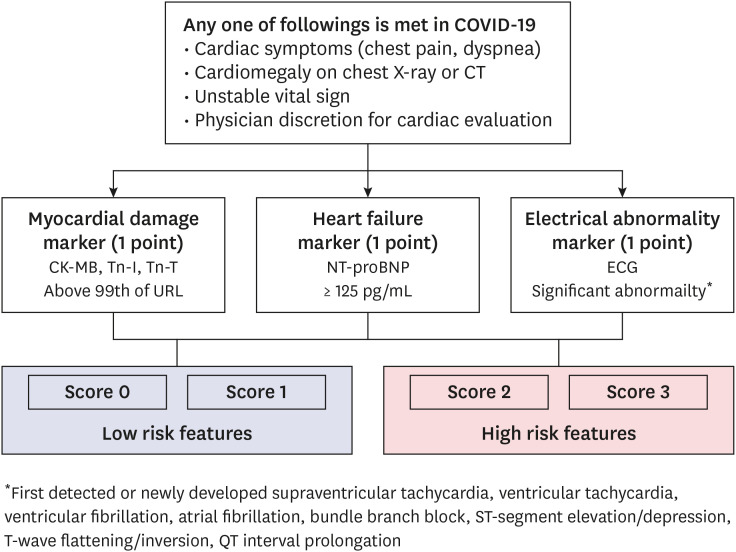J Korean Med Sci.
2020 Oct;35(39):e349. 10.3346/jkms.2020.35.e349.
The Implication of Cardiac Injury Score on In-hospital Mortality of Coronavirus Disease 2019
- Affiliations
-
- 1Division of Cardiology, Department of Internal Medicine, Cardiovascular Center, Keimyung University Dongsan Hospital, Keimyung University College of Medicine, Daegu, Korea
- 2Division of Infectious Disease, Department of Internal Medicine, Keimyung University Dongsan Hospital, Keimyung University College of Medicine, Daegu, Korea
- 3Division of Pulmonology, Department of Internal Medicine, Keimyung University Dongsan Hospital, Keimyung University College of Medicine, Daegu, Korea
- 4Division of Cardiology, Department of Internal Medicine, Seoul St. Mary's Hospital, College of Medicine, The Catholic University of Korea, Seoul, Korea
- 5Heart and Vascular Institute, Pennsylvania State University, Milton S. Hershey Medical Center, Hershey, PA, USA
- KMID: 2507610
- DOI: http://doi.org/10.3346/jkms.2020.35.e349
Abstract
- Background
s: The severe acute respiratory syndrome-coronavirus 2 (SARS-CoV-2) has spread worldwide. Cardiac injury after SARS-CoV-2 infection is a major concern. The present study investigated impact of the biomarkers indicating cardiac injury in coronavirus disease 2019 (COVID-19) on patients' outcomes.
Methods
This study enrolled patients who were confirmed to have COVID-19 and admitted at a tertiary university referral hospital between February 19, 2020 and March 15, 2020. Cardiac injury was defined as an abnormality in one of the following result markers: 1) myocardial damage marker (creatine kinase-MB or troponin-I), 2) heart failure marker (N-terminal-pro B-type natriuretic peptide), and 3) electrical abnormality marker (electrocardiography). The relationship between each cardiac injury marker and mortality was evaluated. Survival analysis of mortality according to the scoring by numbers of cardiac injury markers was also performed.
Results
A total of 38 patients with COVID-19 were enrolled. Twenty-two patients (57.9%) had at least one of cardiac injury markers. The patients with cardiac injuries were older (69.6 ± 14.9 vs. 58.6 ± 13.9 years old, P = 0.026), and were more male (59.1% vs. 18.8%, P = 0.013). They showed lower initial oxygen saturation (92.8 vs. 97.1%, P = 0.002) and a trend toward higher mortality (27.3 vs. 6.3%, P = 0.099). The increased number of cardiac injury markers was significantly related to a higher incidence of in-hospital mortality which was also evidenced by Kaplan-Meier survival analysis (P = 0.008).
Conclusion
The increased number of cardiac injury markers is related to in-hospital mortality in patients with COVID-19.
Figure
Cited by 1 articles
-
Cardiac Imaging of Acute Myocarditis Following COVID-19 mRNA Vaccination
In-Cheol Kim, Hyungseop Kim, Hee Jeong Lee, Ji Yoon Kim, Jin-Young Kim
J Korean Med Sci. 2021;36(32):e229. doi: 10.3346/jkms.2021.36.e229.
Reference
-
1. World Health Organization. Coronavirus disease (COVID-19) outbreak. Updated 2020. Accessed June 5, 2020. https://covid19.who.int/.2. Holshue ML, DeBolt C, Lindquist S, Lofy KH, Wiesman J, Bruce H, et al. First case of 2019 novel coronavirus in the United States. N Engl J Med. 2020; 382(10):929–936. PMID: 32004427.
Article3. Cho DH, Yoo BS, Son JW, Kim IC, Park SM, Choi DJ. COVID-19 — implications for patients with heart failure: the Korean Society of Heart Failure's Clinical Recommendations. Int J Heart Fail. 2020; 2(2):2.
Article4. Guo T, Fan Y, Chen M, Wu X, Zhang L, He T, et al. Cardiovascular implications of fatal outcomes of patients with coronavirus disease 2019 (COVID-19). JAMA Cardiol. 2020; 5(7):811–818. PMID: 32219356.
Article5. Dong Y, Mo X, Hu Y, Qi X, Jiang F, Jiang Z, et al. Epidemiological characteristics of 2143 pediatric patients with 2019 coronavirus disease in China. Pediatrics. 2020; 145(6):e20200702. PMID: 32179660.6. Wang D, Hu B, Hu C, Zhu F, Liu X, Zhang J, et al. Clinical characteristics of 138 hospitalized patients with 2019 novel coronavirus-infected pneumonia in Wuhan, China. JAMA. 2020; 323(11):1061–1069. PMID: 32031570.
Article7. Clerkin KJ, Fried JA, Raikhelkar J, Sayer G, Griffin JM, Masoumi A, et al. Coronavirus disease 2019 (COVID-19) and cardiovascular disease. Circulation. 2020; 141(20):1648–1655. PMID: 32200663.8. Inciardi RM, Lupi L, Zaccone G, Italia L, Raffo M, Tomasoni D, et al. Cardiac involvement in a patient with coronavirus disease 2019 (COVID-19). JAMA Cardiol. 2020; 5(7):819–824. PMID: 32219357.
Article9. Xiong TY, Redwood S, Prendergast B, Chen M. Coronaviruses and the cardiovascular system: acute and long-term implications. Eur Heart J. 2020; 41(19):1798–1800. PMID: 32186331.
Article10. Shi S, Qin M, Shen B, Cai Y, Liu T, Yang F, et al. Association of cardiac injury with mortality in hospitalized patients with COVID-19 in Wuhan, China. JAMA Cardiol. 2020; 5(7):802–810. PMID: 32211816.
Article11. Gao C, Wang Y, Gu X, Shen X, Zhou D, Zhou S, et al. Association between cardiac injury and mortality in hospitalized patients infected with avian influenza A (H7N9) virus. Crit Care Med. 2020; 48(4):451–458. PMID: 32205590.
Article12. Kim IC, Kim HA, Park JS, Nam CW. Updates of cardiovascular manifestations in COVID-19: Korean experience to broaden worldwide perspectives. Korean Circ J. 2020; 50(7):543–554. PMID: 32588565.
Article13. Sandoval Y, Januzzi JL, Jaffe AS. Cardiac Troponin for Assessment of Myocardial Injury in COVID-19: JACC review topic of the week. J Am Coll Cardiol. 2020; 76(10):1244–1258. PMID: 32652195.14. World Medical Association. World Medical Association Declaration of Helsinki: ethical principles for medical research involving human subjects. JAMA. 2013; 310(20):2191–2194. PMID: 24141714.15. Huang C, Wang Y, Li X, Ren L, Zhao J, Hu Y, et al. Clinical features of patients infected with 2019 novel coronavirus in Wuhan, China. Lancet. 2020; 395(10223):497–506. PMID: 31986264.
Article16. Bodor GS. Biochemical markers of myocardial damage. EJIFCC. 2016; 27(2):95–111. PMID: 27683523.17. Thygesen K, Alpert JS, Jaffe AS, Chaitman BR, Bax JJ, Morrow DA, et al. Fourth universal definition of myocardial infarction (2018). Circulation. 2018; 138(20):e618–51. PMID: 30571511.
Article18. Kim MS, Lee JH, Kim EJ, Park DG, Park SJ, Park JJ, et al. Korean Guidelines for diagnosis and management of chronic heart failure. Korean Circ J. 2017; 47(5):555–643. PMID: 28955381.19. Ponikowski P, Voors AA, Anker SD, Bueno H, Cleland JG, Coats AJ, et al. 2016 ESC Guidelines for the diagnosis and treatment of acute and chronic heart failure: The Task Force for the diagnosis and treatment of acute and chronic heart failure of the European Society of Cardiology (ESC)Developed with the special contribution of the Heart Failure Association (HFA) of the ESC. Eur Heart J. 2016; 37(27):2129–2200. PMID: 27206819.20. Morrow DA, Velazquez EJ, DeVore AD, Prescott MF, Duffy CI, Gurmu Y, et al. Cardiovascular biomarkers in patients with acute decompensated heart failure randomized to sacubitril-valsartan or enalapril in the PIONEER-HF trial. Eur Heart J. 2019; 40(40):3345–3352. PMID: 31093657.
Article21. Lee JH, Kim MS, Kim EJ, Park DG, Cho HJ, Yoo BS, et al. KSHF Guidelines for the management of acute heart failure: part i. definition, epidemiology and diagnosis of acute heart failure. Korean Circ J. 2019; 49(1):1–21. PMID: 30637993.
Article22. Yancy CW, Jessup M, Bozkurt B, Butler J, Casey DE Jr, Drazner MH, et al. 2013 ACCF/AHA guideline for the management of heart failure: executive summary: a report of the American College of Cardiology Foundation/American Heart Association Task Force on practice guidelines. Circulation. 2013; 128(16):1810–1852. PMID: 23741057.23. World Health Organization. Shortage of personal protective equipment endangering health workers worldwide. Updated 2020. Accessed June 5, 2020. http://www.who.int/news-room/detail/03-03-2020-shortage-of-personal-protective-equipment-endangering-health-workers-worldwide.24. Akhmerov A, Marbán E. COVID-19 and the heart. Circ Res. 2020; 126(10):1443–1455. PMID: 32252591.
Article25. Zheng YY, Ma YT, Zhang JY, Xie X. COVID-19 and the cardiovascular system. Nat Rev Cardiol. 2020; 17(5):259–260. PMID: 32139904.
Article26. Hu H, Ma F, Wei X, Fang Y. Coronavirus fulminant myocarditis saved with glucocorticoid and human immunoglobulin. Eur Heart J. 2020; ehaa190. PMID: 32176300.27. van Doremalen N, Bushmaker T, Munster VJ. Stability of Middle East respiratory syndrome coronavirus (MERS-CoV) under different environmental conditions. Euro Surveill. 2013; 18(38):20590. PMID: 24084338.
Article28. Kim IC, Kim JY, Kim HA, Han S. COVID-19-related myocarditis in a 21-year-old female patient. Eur Heart J. 2020; 41(19):1859. PMID: 32282027.
Article29. Alhogbani T. Acute myocarditis associated with novel Middle east respiratory syndrome coronavirus. Ann Saudi Med. 2016; 36(1):78–80. PMID: 26922692.
Article30. Maisch B, Portig I, Ristic A, Hufnagel G, Pankuweit S. Definition of inflammatory cardiomyopathy (myocarditis): on the way to consensus. A status report. Herz. 2000; 25(3):200–209. PMID: 10904839.
- Full Text Links
- Actions
-
Cited
- CITED
-
- Close
- Share
- Similar articles
-
- Cardiovascular Manifestations of COVID-19
- Analysis on 54 Mortality Cases of Coronavirus Disease 2019 in the Republic of Korea from January 19 to March 10, 2020
- Clinical and Epidemiological Characteristics of Coronavirus Disease 2019 in the Early Stage of Outbreak
- Myoclonic status epilepticus after severe hyperthermia in a patient with coronavirus disease 2019
- Updates of Cardiovascular Manifestations in COVID-19: Korean Experience to Broaden Worldwide Perspectives




